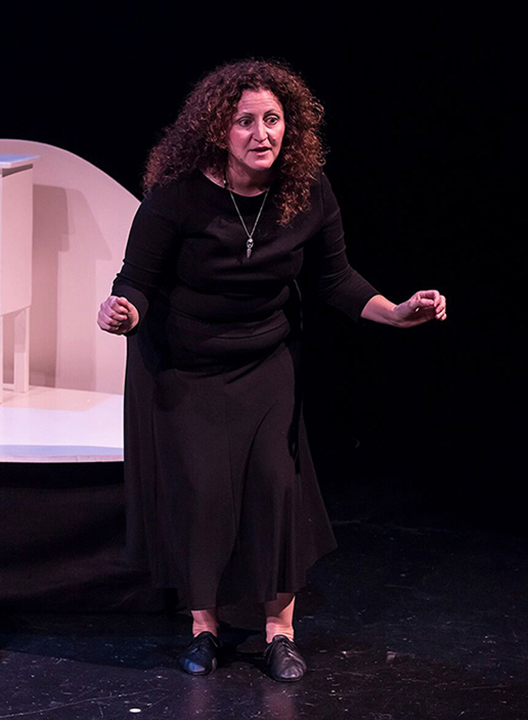 Professor Elaine Gale takes her one-woman show, One Good Egg, to New York for two performances. (Photo courtesy of Elaine Gale)
Professor Elaine Gale takes her one-woman show, One Good Egg, to New York for two performances. (Photo courtesy of Elaine Gale)Elaine Gale calls herself a “Possibilitarian,” not an Episcopalian or a Presbyterian like most residents of her hometown of North Platte, Neb.
That’s a line from the newly hatched one-woman show, One Good Egg, which she performs in its New York City debut off-Broadway this month.
Few other explanations for her decision to write and perform a solo stage production when she hadn’t taken acting classes since high school hold water.
“I remember one day I wrote ‘one-woman show’ on my whiteboard,” says Gale, a Sacramento State communication studies and journalism professor. “I had no idea how to do that. But I considered it a spiritual assignment, and I knew I would meet the right people to teach me and help me figure it out.”
She will find out soon enough. One Good Egg was picked up by United Solo, a prestigious festival of one-person productions in New York. It plays Oct. 19-20 on Theatre Row. The Oct. 19 show was sold out by mid-August.
The show essentially is an autobiography. Gale says that One Good Egg is packed with humor but has a vast “emotional palette.”
“It’s a midlife story – about kind of coming to terms with saying goodbye to your youth and innocence and celebrating the life you have,” she says.
Her producer, Julie Fishell, says it’s relatable to anyone “who’s ever had their idea of what their life should look like suddenly supplanted with another image – which I think pretty much covers all of us.”
Gerri Smith, chair of Sac State’s Department of Communication Studies, says it would appeal to people who have struggled with identity, family and relationships, and to women in particular.
“It’s very poignant; it’s very personal,” Smith says, adding praise for Gale’s storytelling skills. “It’s funny. She’s got a great sense of humor. It’s less of a play and more of a story.”
Gale agrees and does not refer to the show as a play, calling it a “nonfiction mash-up of storytelling, comedy and theater.”
Gale’s storytelling roots were planted in Sacramento, where in 2012 she co-founded TrueStory, a nonfiction literary reading series that she also co-coordinated for five years. It regularly played to full houses and still does pop-up events.
She enjoyed the short standup sets she developed, but then realized the setup/punchline structure was too narrow for her purpose.
“I realized I wanted to tell a longer story,” she says. “I was actually really interested in the sadness of life. … If you have a dream and that dream is broken, then how do you navigate your life?”
Fishell, an award-winning actor, director and teacher, praises Gale as a strong writer, fast learner and natural performer. Teaching, she says, is like boot camp for theater – and that challenge is especially true for Gale in her Egg show, where she's alone on stage with no one to give a boost if her energy flags during the 78-minute performance.
Gale wants the manuscript published, she says, and has applied for a CSU grant for faculty interested in non-academic entertainment endeavors. The opportunity to take Sac State beyond the academic world and into entertainment is thrilling, she says.
And audiences have responded, illustrated by sellout crowds at workshop performances (done with without a set) in Oakland, Los Angeles and locally at Sacramento’s Brickhouse Gallery and Art Complex, and at four fully staged shows at Center Stage Theater in Santa Barbara, directed by Rod Lathim, in May 2017.
Those included a benefit performance that raised $10,000 for the nonprofits Direct Relief and Hospice of Santa Barbara. Preview shows for United Solo were Oct. 5-6 at the Live Oak Unitarian Universalist Congregation in Santa Barbara and also were well received. All the shows, including the workshop performances, sold out and received standing ovations.
That success could continue; a producer in Los Angeles wants to put on a run of One Good Egg there next year.
“Storytelling is a bridge across the chasm from one human being to another,” Gale says. “There’s something in the story that people are responding to that has some universal appeal.” – Ahmed V. Ortiz
